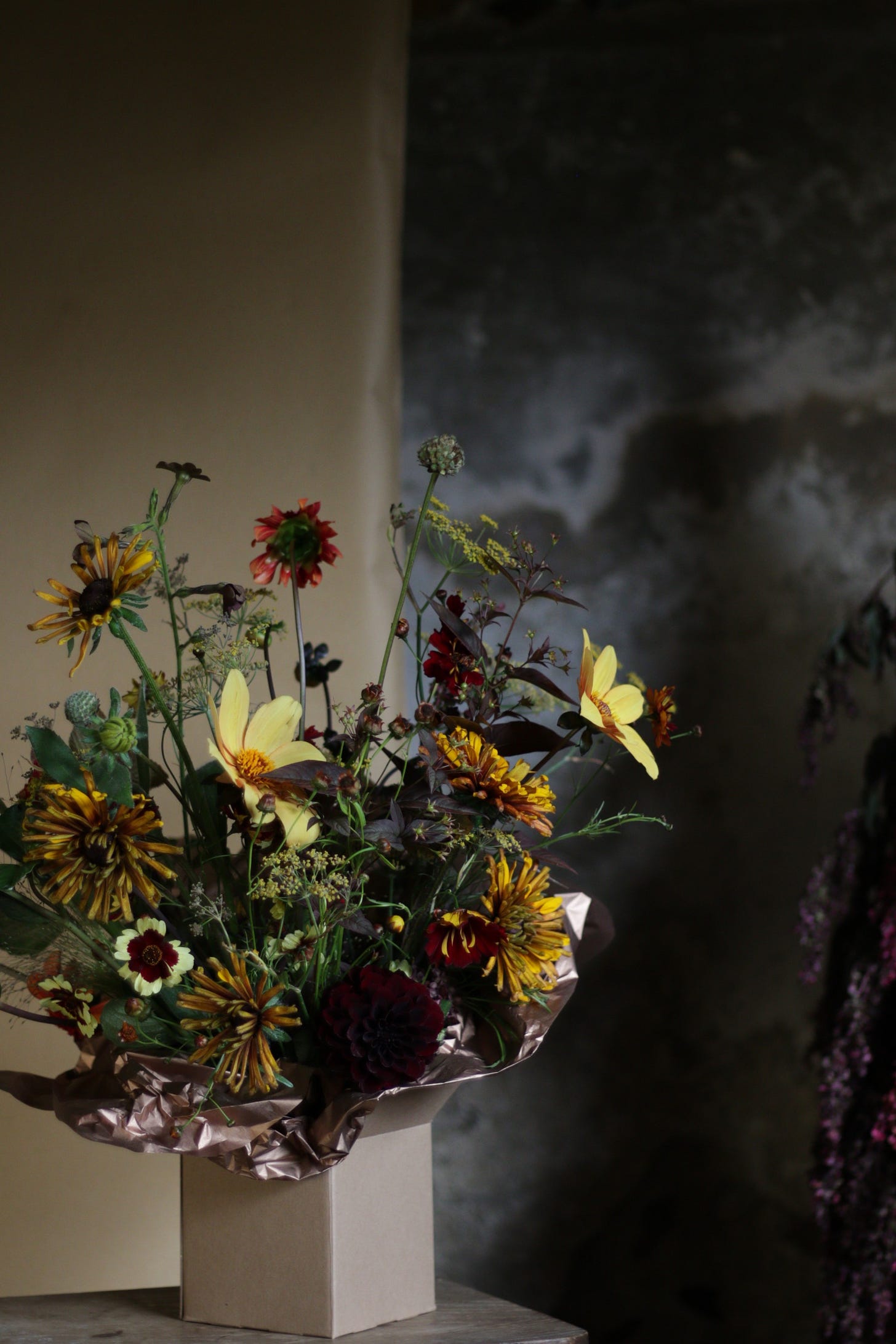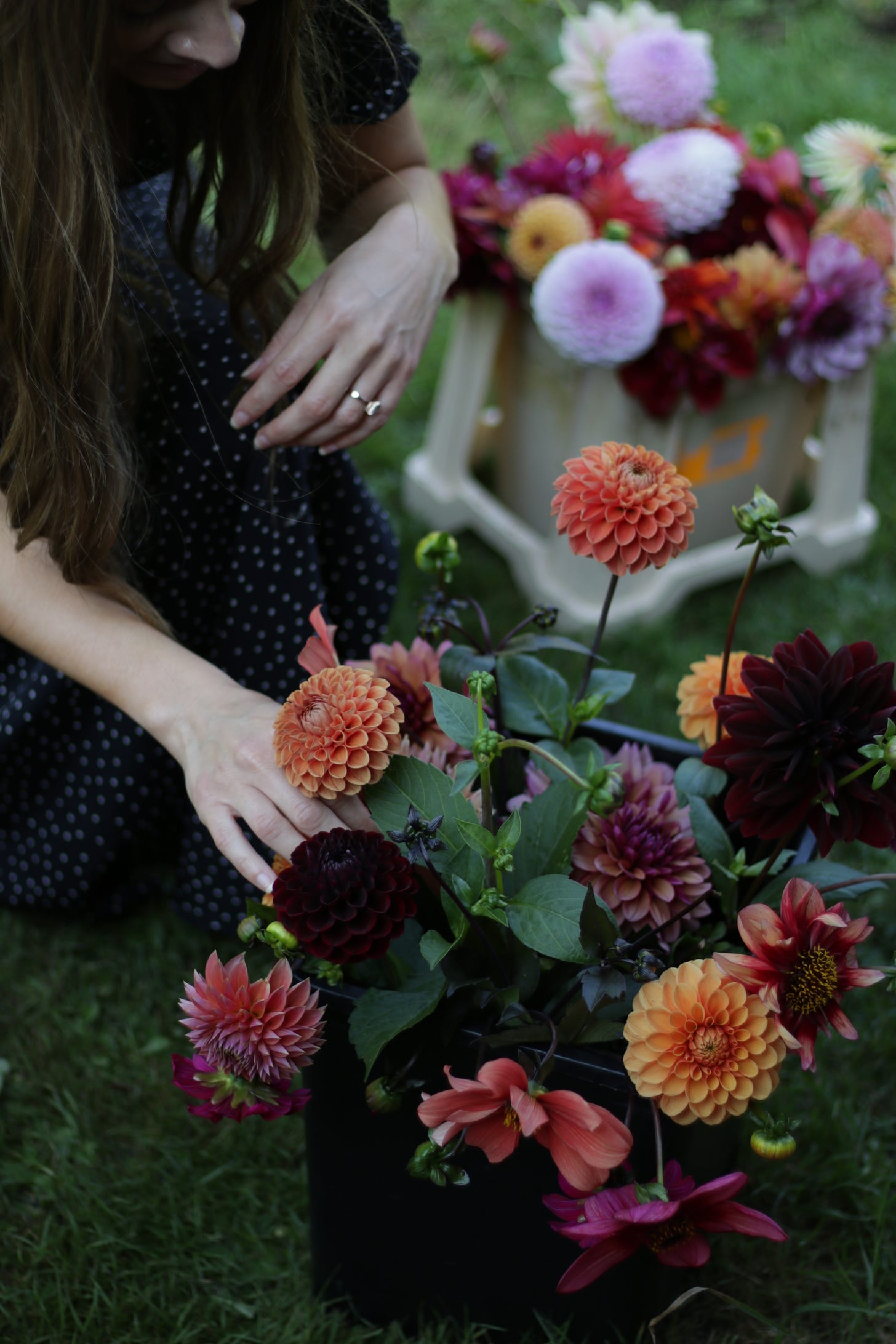‘Why Flowers Matter’ is a series reviewing the impact and benefits of the global and local growing industries.
Customer, Customer,
How do your (cut) flowers grow?
In a land far away,
But how, I don’t know.
Do you ever cut a flower from your garden? Have you noticed how they twist and turn over the day, toward the light, as it moves across the room? A flower will open wide, it’s scent filling the room and pollen dropping. Eventually the petals do too; leaving you with the story of the stem on your table, to be swept up and returned to earth via the compost heap.
Usually, an imported bloom doesn’t give this kind of performance. The bud might open a little, but there is rarely scent and certainly little movement. These features clearly appeal to the consumer. It seems counter intuitive to me as a grower of flowers. I want to see that development of the flower because that is nature and what I expect. But for many consumers, that movement is unwelcome, unappreciated and frankly, a mess.
In a fast paced modern world, it is likely you haven’t grown a flower and unaccustomed to the ‘natural’ change. Preferring to place your flowers in a vase and expect them to last a long time, at least a week, until you return to the supermarket replacing your bunch.
There is an expectation met by this type of product. Retailers respond to this and provide reliably performing flowers for an unreliable end treatment by the customer.
To sell flowers, several days, if not weeks after they have been cut, in a bright and warm environment, takes some strong chemicals to maintain the illusion. Just imagine if you cut a rose in bud on a Monday - how long would it last in the waitrose foyer do you think?
Supermarket environments are the exact opposite of what is needed for a flower to be kept in the best condition in the vase. The ideal situation is church like. Cool, out of draughts, away from heat sources and bright light. Fruit, especially bananas extrude a chemical that hastens the ripening process. Flowers and fruit together do not make a happy pairing. Yet they are often placed side by side for sale.
Not only do you need a lot of chemicals and stable conditions to grow the plants to ‘perfection’, unblemished petals and leaves, stems so tall and straight, but also to maintain that quality after cutting from the plant, to be packaged and transported.
When perhaps we are used to glyphosate, pesticides and fertilisers used by farmers in the UK for our foods, perhaps you might wonder what is the problem, if it is ‘safe’ on our food and soils in the UK?
Well of course, these chemicals are not safe, but the ones in far flung equatorial countries where many imported flowers are grown are even more problematic. Often these countries are still using known toxic chemicals to increase yields, reducing weed and pests to produce ‘perfect’ flowers that can be transported. These particular chemicals are banned in the EU since they are now considered so toxic to human, animal and soil life. (1)
Horrifyingly, there is evidence that there are residues of these chemicals on stems and leaves at 1000x the ‘safe’ dose on food. When did you last put on PPE gloves and masks to protect yourself before you stripped the leaves off your rose bunch bought with the weekly shop. Or used the bread knife on a wooden board to trim the stems? Did you wash it all down? Unlikely. 86% of stems bought in the UK will have traces of chemicals on them. (2)
‘The UK is at the centre of a pesticide scandal’ and guilty of ‘exploitative hypocrisy’ (3) says Doug Parr, Chief Scientist at Greenpeace. Manufacturing these EU banned chemicals, so toxic that we won’t use them ourselves. But we welcome the huge revenues that are produced by making and exporting them to other parts of the world where, it seems, worker, animal and soil life is valued far less in the name of cheap production of a product we can import back. And buy very cheaply in the supermarket
But at what real cost?
Still with the arrogance of imperialism, the UK produces over 40% of the EU’s banned chemical exports, manufactured here and sent out all over the world. How can it be ethical let alone legal to still manufacture these chemicals and export them? (4)
Those chemicals get shipped out, in drums with toxic labels on. Then returned, hidden in plain sight, on the Friday night trolley grab, on your bridal bouquet, on the coffin of a loved one. Illegal to spray on our soils but acceptably handled on ‘natural’ stems.
Think of the hoops Organic growers need to jump through to prove that their methods are good for the environment. Yet it is entirely legal to greenwash us with sustainability statements whilst withholding the truth. ‘This packaging is recyclable but the product is covered with trace chemicals may cause actual human harm’.
Governments do not lead change, our individual choices do. Smoking was not banned until the vast majority of the population didn’t smoke. Change comes when the population shows a demand through their behaviour; governments respond to that. Government rarely lead change with legislation.
It is the retailers that need to drive this revolution. They know how flowers are grown but the supply chains are very complex, transactional with short and temporary contracts. The volumes are too large to monitor on the weekly bases required. They too are midst a huge challenge. But supermarkets are the biggest sellers of flowers in the UK, over 70% of the $2.2 Billion spent (5), they have the responsibility placed squarely at their feet.
Next week, I will be looking into who grows cut flowers.
Sources
For further information and research.
National Wildlife Federation ‘Pesticides and Cut Flowers’ (USA)
“Cut Flowers and Indoor Plants” are bundled together because they are grown and transported together. Note, this figure does not include the horticultural or landscaping industry value. The Flowers and Plants Association
This is the third in a series ‘Why Flowers Matter’, the fourth will be delivered next Sunday. I want to take you a little further into the world of flower growing. Is it as beautiful as you thought?
Please like and comment to help more people find this newsletter and grow it organically. Better still, share it with your friends or on your social media.
Thank you for reading. This newsletter is a reader-supported publication. The best way to support it is to become a paid subscriber for bonus Tuesday newsletters, hire me to mentor or consult with you about your garden or growing business or hire me to speak.
Your support is very appreciated and helps me grow this newsletter organically without the chemical inputs of sponsorship or ads.











This is so important, Anna. It’s not surprising but it is high time that this was widely known and discussed. Fantastic to have people like you spelling it out with clarity and understanding.